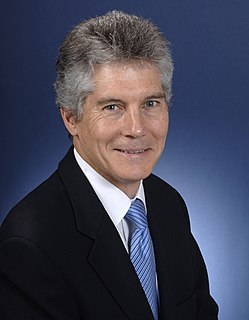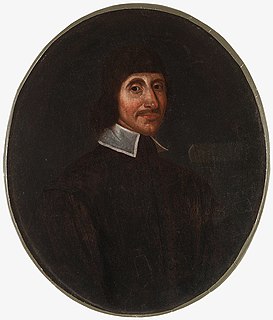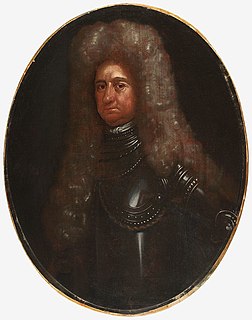Related Research Articles

Columbite, also called niobite, niobite-tantalite and columbate [(Fe, Mn)Nb
2O
6], is a black mineral group that is an ore of niobium. It has a submetallic luster and a high density and is a niobate of iron and manganese. This mineral group was first found in Haddam, Connecticut, in the United States. It forms a series with the tantalum-dominant analogue ferrotantalite and one with the manganese-dominant analogue manganocolumbite. The iron-rich member of the columbite group is ferrocolumbite. Some tin and tungsten may be present in the mineral. Yttrocolumbite is the yttrium-rich columbite with the formula (Y,U,Fe)(Nb,Ta)O
4. It is a radioactive mineral found in Mozambique.

John Winthrop was an English Puritan lawyer and one of the leading figures in founding the Massachusetts Bay Colony, the second major settlement in New England following Plymouth Colony. Winthrop led the first large wave of colonists from England in 1630 and served as governor for 12 of the colony's first 20 years. His writings and vision of the colony as a Puritan "city upon a hill" dominated New England colonial development, influencing the governments and religions of neighboring colonies.

The Connecticut Colony or Colony of Connecticut, originally known as the Connecticut River Colony or simply the River Colony, was an English colony in New England which became the state of Connecticut. It was organized on March 3, 1636 as a settlement for a Puritan congregation, and the English permanently gained control of the region in 1637 after struggles with the Dutch. The colony was later the scene of a bloody war between the colonists and Pequot Indians known as the Pequot War. Connecticut Colony played a significant role in the establishment of self-government in the New World with its refusal to surrender local authority to the Dominion of New England, an event known as the Charter Oak incident which occurred at Jeremy Adams' inn and tavern.

Stephen Francis Smith is a former Australian politician who was a member of the House of Representatives from 1993 to 2013. He served as a minister in the Rudd and Gillard Governments, including as Minister for Foreign Affairs (2007–2010), Minister for Trade (2010), and Minister for Defence (2010–2013).

John Winthrop the Younger was an early governor of the Connecticut Colony, and he played a large role in the merger of several separate settlements into the unified colony.

The Saybrook Colony was an English colony established in late 1635 at the mouth of the Connecticut River in present-day Old Saybrook, Connecticut by John Winthrop, the Younger, son of John Winthrop, the Governor of the Massachusetts Bay Colony. Winthrop the Younger was designated Governor by the original settlers, including Colonel George Fenwick and Captain Lion Gardiner. They claimed possession of the land via a deed of conveyance from Robert Rich, 2nd Earl of Warwick. The colony was named in honor of Lords Saye and Brooke, prominent Parliamentarians and holders of the colony's land grants.

Thomas Lindall Winthrop was a Massachusetts politician who served as the 13th Lieutenant Governor of Massachusetts from 1826 to 1833. He was elected both a Fellow of the American Academy of Arts and Sciences in 1813 and a member of the American Antiquarian Society in 1837.

Winthrop Hale "Ding" Palmer, Jr. was an American ice hockey player who competed in the 1932 Winter Olympics. He died in Warehouse Point, Connecticut.

Fitz-John Winthrop, was the governor of the Colony of Connecticut from 1698 until his death on November 27, 1707.

Winthrop Hiram "Win" Smith was an American businessman and investment banker. He was notable as a name partner of Merrill Lynch, Pierce, Fenner & Smith.
Waitstill Winthrop was a colonial magistrate, military officer, and politician of New England.

Jonathan Milton Nelson is an American businessman and investor. He is the founder of Providence Equity Partners, a global private equity firm based in Providence, Rhode Island, which manages funds with over US$45 billion in commitments. As of January 2022, Nelson's net worth as estimated by Forbes is 2.2 billion dollars.
Mary and John was a 400-ton ship that is known to have sailed between England and the American colonies four times from 1607 to 1633. She was during the later voyages captained by Robert Davies and owned by Roger Ludlow (1590–1664), one of the assistants of the Massachusetts Bay Colony. The ship's first two voyages to North America were to what is now Maine in June 1607 and September 1608, transporting emigrants to the colonies and back to England. The third voyage was on March 20, 1630, bearing 130 colonists, and the fourth on March 26, 1634, to Nantaskut in the Massachusetts Bay Colony.
Justin B. Smith is an American businessman and former chief executive officer of Bloomberg Media Group. Prior to joining Bloomberg, Smith worked for Atlantic Media, The Week magazine and The Economist.
The Gilded Age is a historical drama television series created by Julian Fellowes for HBO that is set in the United States during the Gilded Age, the boom years of 1880s New York City. Originally announced in 2018 for NBC, it was later announced in May 2019 that the show was moved to HBO. The series premiered on January 24, 2022.
Jörg Imberger is an Australian civil engineer.

Rufus Albertson Soule Sr. was a politician in Massachusetts. He served in the 1901 Massachusetts legislature and the 1902 Massachusetts legislature as president of the senate both years. Winthrop M. Crane was governor.
Jeffrey Victor Rosenfeld is an Australian neurosurgeon and professor of medicine. He is a senior neurosurgeon in the Department of Neurosurgery at The Alfred Hospital, and the Emeritus Professor of Surgery at Monash University, as well as being a major general in the Australian Defence Force, where he has served as a general surgeon since 1984. His research has focussed on traumatic brain injury, bionic vision, and medical engineering. He is best known for devising an operation to remove hypothalamic haematomas from children's brains.
Ting-Kuo Lee is a Taiwanese physicist.
Robert John Nemanich is an American physicist.
References
- ↑ "Winthrop Smith". University of Connecticut. Retrieved 27 January 2022.
- ↑ "APS fellow archive" . Retrieved 27 January 2022.